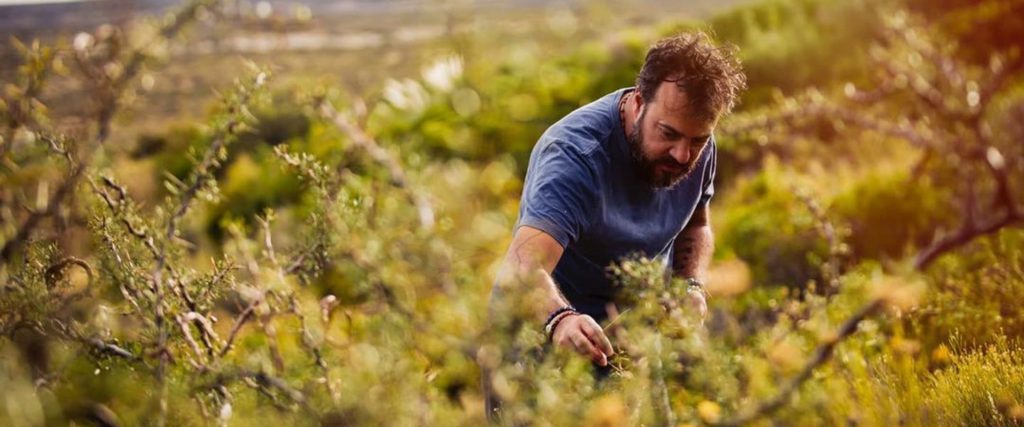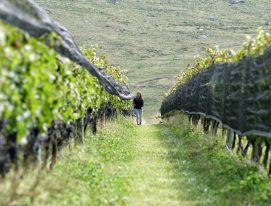The restless traveler Tato Giovannoni is always piloting some kind of vessel; it might be metaphorical or otherwise but is always branded with his name and a red anchor logo. In this interview he discusses the projects he has planned for 2024 having spent nine months outside of Argentina, which means he hasn’t set foot in his home town of Pinamar or his Florería bar in Buenos Aires for quite some time.
Days before the tenth anniversary of Florería Atlántico – Arroyo 872, Buenos Aires, in the basement below a florists – which regularly appears on lists of the best bars in the world, particularly the industry bible,The World’s 50 Best Bars – Tato Giovannoni lets us in on what’s coming up: there’ll be a new Brasero Atlántico in Bahrain opening in July and in a year – if all goes well – a Florería and Brasero in Washington DC. There are also plans afoot for another in Milan or in another location in the USA.
Tato Giovannoni: an active volcano
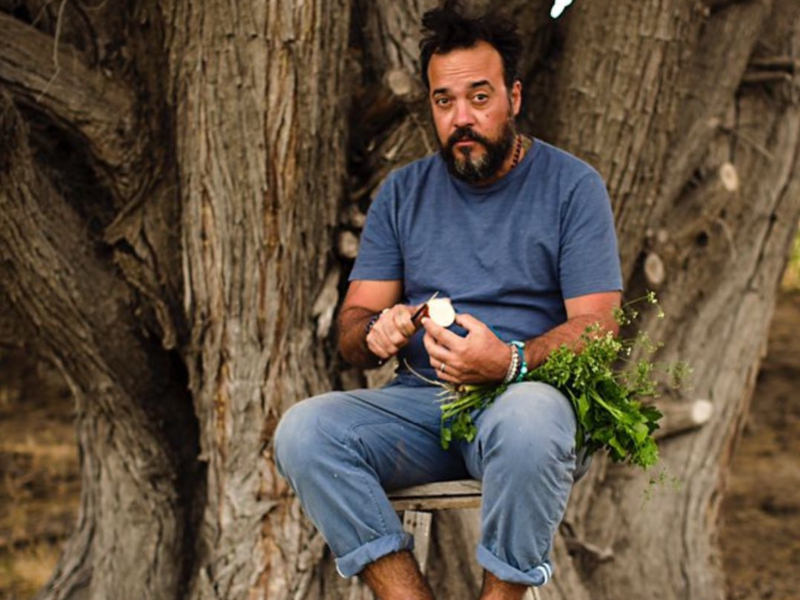
Then there’s his drinks business and distillery in Mendoza, which makes Tato Giovannoni happy because “we’re going to have somewhere to play.” Chola, a Fernet, will be released in 2024 to accompany his vermouths, Apóstoles gins (Sweetbrier, Fuerza Gaucha and Apóstoles normal); El Profeta moonshine, Pan vodka and different sodas.
There’s also an as yet unnamed and unlabeled wine that comes from the world’s most ocean-adjacent vineyard in Bahía Bustamante (Chubut Province, Argentina). “It’s a shared project among friends. Wines from the sea, which began as an experiment, a group of crazy guys who just wanted to see whether they could get grape vines to grow. They did, and we’ve made wine from them. Not much, but enough. This year, we made some changes, planted three-year-old seedlings and the original plants are about six years old.
The wine is excellent, it’s strange, different, we’re improving our winemaking methods. We’ve had vintages but haven’t released them on the market because they’re for our own consumption but I think that soon, in 2024, we’ll be able to sell some because we’re producing more. It’s closer to the sea than any other vineyard in the world and it’s great, because I love the sea, in a town in the middle of nowhere, Bahía Bustamante, difficult to get to, surrounded by an incredible natural landscape.
“I never considered making wine, I don’t know how to make wine. I went to Bahía Bustamante, dug a little hole in the ground, and saw that it was arid, like Mendoza. I sent a message to Matías Michelini, asking him if he thought we could plant grapes. He said yes, and we were planting six months later. When it’s high tide, it’s amazing, the first two rows of vines are under water.
And it’s amazing how in two very small parcels you can still detect different flavors, from the sea and from the seaweed that has always been there. But I don’t make wine, I don’t see myself making wine.
“But the combination of wine, the earth, Patagonia and the sea… What I most enjoy about projects is making them a reality. The decision that the first three thousand holes would be dug by the family, by hand and not a tractor, has already given me plenty of stories. We planted Pinot Noir first, then Semillón, and Albariño two years ago. Semillón because I love it. Pinot Noir works very well with the sea, and Albariño because there’s not much of it around.”
What differences do you encounter running businesses in such different places, with such contrasting cultures?
Everywhere has its own challenges, its own positives and negatives. Coming from South America, Argentina, you think that doing things overseas is going to be easy but then you find that in some ways it’s not at all, even if there is less bureaucracy. You have to be familiar with local idiosyncrasies and ways of life. I’ve spent plenty of time in Barcelona but never so long as I did in 2023 and you learn about how people eat, drink, and go out. It’s an enormous city but the Catalans and other locals don’t go out so much.
It’s a tourist area, which is different from when we opened Florería in Buenos Aires, because it wasn’t so touristy. In Bahrain people have more money in their pockets and it’s one of the more open Arab countries. You can drink, it’s a small principality with a good economy and a willingness to open up a little more to the rest of the world in terms of cuisine. A lot of new restaurants are opening, so it’s unknown territory. I’m eager to learn about the culture and local ways of life.
I love Washington DC, the gastronomic scene is growing and expanding significantly. There are university students, politicians, a lot of art, a lot of vernissage, openings and launches. For our expansion of Florería and Brasero we didn’t want it to be a carbon copy of Buenos Aires, because that would be boring. I want to have the challenge of understanding a place inspired by migration, because that’s the story of Florería: what happened in Argentina, in the Americas, and how humanity has always been on the move, ever since we came into existence.
We’ve moved from here to there, bringing our own seeds and customs and adapting to different places. So, the Florería in DC is going to tell a little more of the story of the immigrants that settled on the east coast of the USA, via Virginia. Every Florería is going to have a section or corner like the classics in Buenos Aires with cocktails and a few dishes. Brasero Atlántico is going to fly the flag for Argentina a little more and evoke the immigrants who came to Argentina and spread across the country; there’ll be a little more meat, preserves and game.
The same dream as always
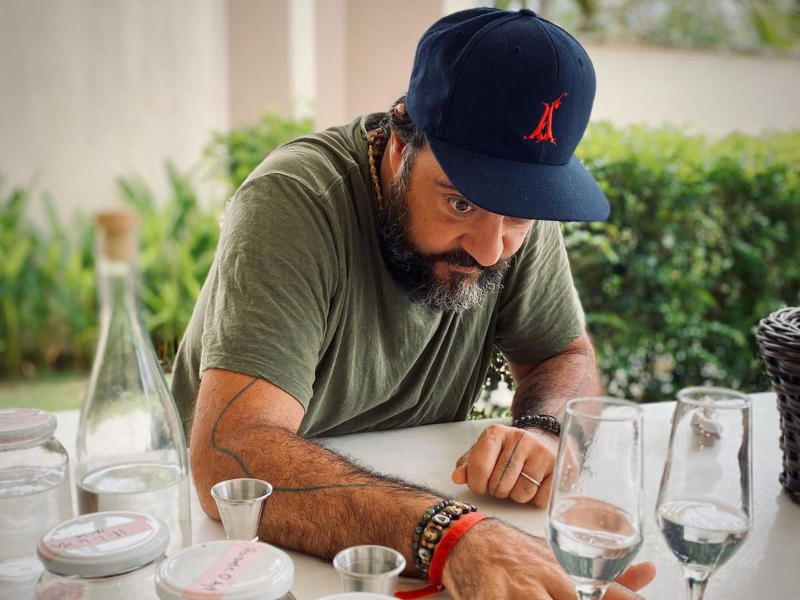
Is the Roku Prize your Balon D’Or?
(Laughs) I don’t know. I wasn’t expecting it. Years ago, I thought I’d like to win an iconic industry award like that. When they gave me the Bartender Bartender I wasn’t expecting it either because I think that I’ve outgrown that role a little, although I do still work behind a bar. There are a lot of young bartenders out there who deserve that award.
But, yes, it’s a kind of a Balon D’Or. It’s recognition, the dream of representing my country and telling people about Argentina, who we are, what we’re like, what we do and sharing that with the world. Because that’s what the award is about, when I go out I’m not just Tato Giovannoni, the egocentric always talking about himself, but also sharing my country, talking about my country, my culture. That was always a dream of mine.
As regards your profession, where are you in your career?
I’ve found a way to stay linked to the bar. Before, I thought that the only way was to serve customers. There are a lot of different subtle aspects to it, it helped me understand everything I’ve studied in my life, the curiosities, learning about anthropology, humanity and its movements, botanics… it’s all a part, or I try to make it a part, of what I do, which at the end of the day is a bar, a restaurant.
I think that if my profession had just been standing behind a bar, I’d be doing something else. In terms of opening up to the world, I think that Florería in Buenos Aires gave us exposure, Buenos Aires and myself individually. Today, that opens a lot of doors. That doesn’t mean it’s easy but when you ring the doorbell, you know who you are, where you come from, that you have a background and a history.
And the idea of Argentinians going out to conquer the world with their wit and ingenuity…
We’re a unique people, there’s been a mixture like nowhere else. We’re mixed in a way you don’t see elsewhere, we have something special in our DNA. We’re used to living in hope, always, when we vote, when we support a team, getting up every day even if you’ve run out of money, to keep on striving and working. The Argentine who goes out into the world, for whatever reason, is pure talent and they accompany that with effort. It’s not easy living in Argentina and it never has been.
The love for the country
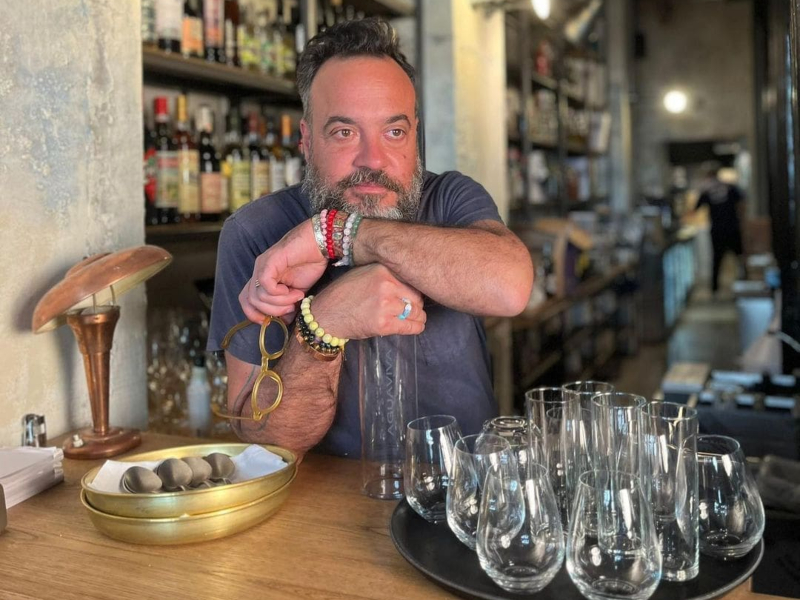
How do you represent the country and its traditions through drinks, menus and settings?
I don’t know. I’ve loved my country since I was little, I always wanted to represent it, playing sport or something. Sometimes, I still go to bed dreaming of winning an Olympic medal. When I studied film, I dreamed of winning an Oscar and the speech, which would be in Spanish because I was going to talk about Argentina. I feel that I can communicate what it means to be Argentinian and that people see Argentina in what I do, because I like to study and think and learn about who we are. But if it’s not accompanied by genuine passion, real storytelling…
When I start developing something, I want it to represent a piece of my land or culture. The menus at Florería are getting more and more Argentine. Hiring a historian, Felipe Pigna, to create a list of cocktails didn’t just come about by chance. I want the people who work with me to have the information and to know their country.
What is your opinion of the state of the drinks industry in Argentina?
It doesn’t stop growing. It’s great to see more and more people distilling and producing. I’d like for there to be more Argentine products, more whiskey and brandy. It’s easier to make gin or vodka and the market for gin might soon be saturated in Argentina. But you also need to know that a lot of people get into it because they see it can be a successful business. There are a lot of well-conceived brands and others that aren’t so much. But we grew up looking down on our products, believing that nothing made in Argentina could be good and now there are a lot of quality products. Today, Argentinians choose to drink Argentinian.

